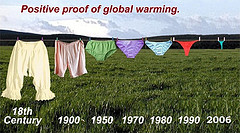
Last year China took a record from the US that it probably didn’t want to have- the unenviable tag of being the world’s largest Carbon Dioxide emitter. To be fair to China, the subsequent finger wagging it received from the West was largely unjustified. It has a vastly larger population that the US, a burgeoning industrial sector, and as I mentioned in a previous blog a rapidly car-driving society. Even with all this in mind, China emits a ‘mere’ 4 tonnes of CO2 per citizen per year compared with other OECD members whose average comes to about 11 tonnes.
 However, in the larger scheme of things (and by that I mean Global Climate Change) the cumulative total CO2 expulsion by China is genuinely too big to ignore, however unfair criticism might be it has to try and limit its carbon output. Which is why the recent announcement by President Hu Jintao at the UN convention should come as a relief. If President Hu can be taken at his word, then it bodes well not just for China, but also for the whole world.
However, in the larger scheme of things (and by that I mean Global Climate Change) the cumulative total CO2 expulsion by China is genuinely too big to ignore, however unfair criticism might be it has to try and limit its carbon output. Which is why the recent announcement by President Hu Jintao at the UN convention should come as a relief. If President Hu can be taken at his word, then it bodes well not just for China, but also for the whole world.
Speaking at the summit in Copenhagen, Hu claimed that China ‘[has]taken and will continue to take determined and practical steps to tackle this challenge’, and will ‘vigorously develop’ alternative energies- including nuclear power- to try and combat China’s overwhelming reliance on fossil fuels (and especially coal which provides 70% of it’s energy need). The aim of which being to ‘cut carbon emissions per unit of GDP by a notable margin by 2020’.
Proving that it wasn’t just hot air, the President then went on to say how the government aimed to increase the share of non-fossil fuels to 15% of energy output by 2020, and to plant 40 million hectares of forest to absorb carbon emissions.
 The move has been widely hailed as ‘impressive’ and ‘significant’ and it is hoped that with China committed to combating climate change, many more countries will be willing to follow suit. Not that China’s new position is motivated purely by philanthropic concerns; the country has a terrible ‘energy intensity’ and the cost of every extra unit of GDP in China is 6 times more expensive than in Europe. Moreover as the cost of oil rises so too does the cost to the government of subsidizing fuel supply and buying it in the first place.
The move has been widely hailed as ‘impressive’ and ‘significant’ and it is hoped that with China committed to combating climate change, many more countries will be willing to follow suit. Not that China’s new position is motivated purely by philanthropic concerns; the country has a terrible ‘energy intensity’ and the cost of every extra unit of GDP in China is 6 times more expensive than in Europe. Moreover as the cost of oil rises so too does the cost to the government of subsidizing fuel supply and buying it in the first place.
On balance though, does it really matter why China is trying to reduce its CO2 emissions? Whatever the motivations, the result is a cleaner world for all of us.



